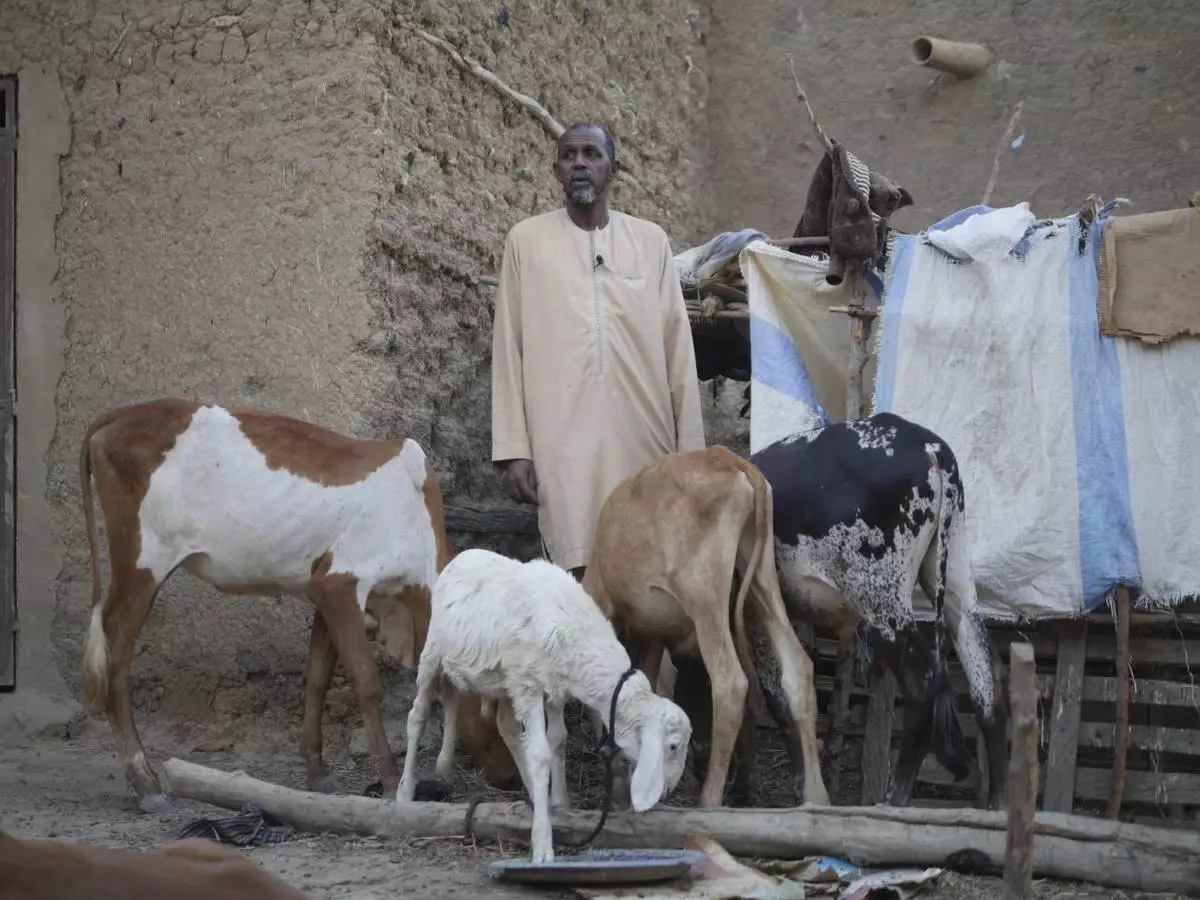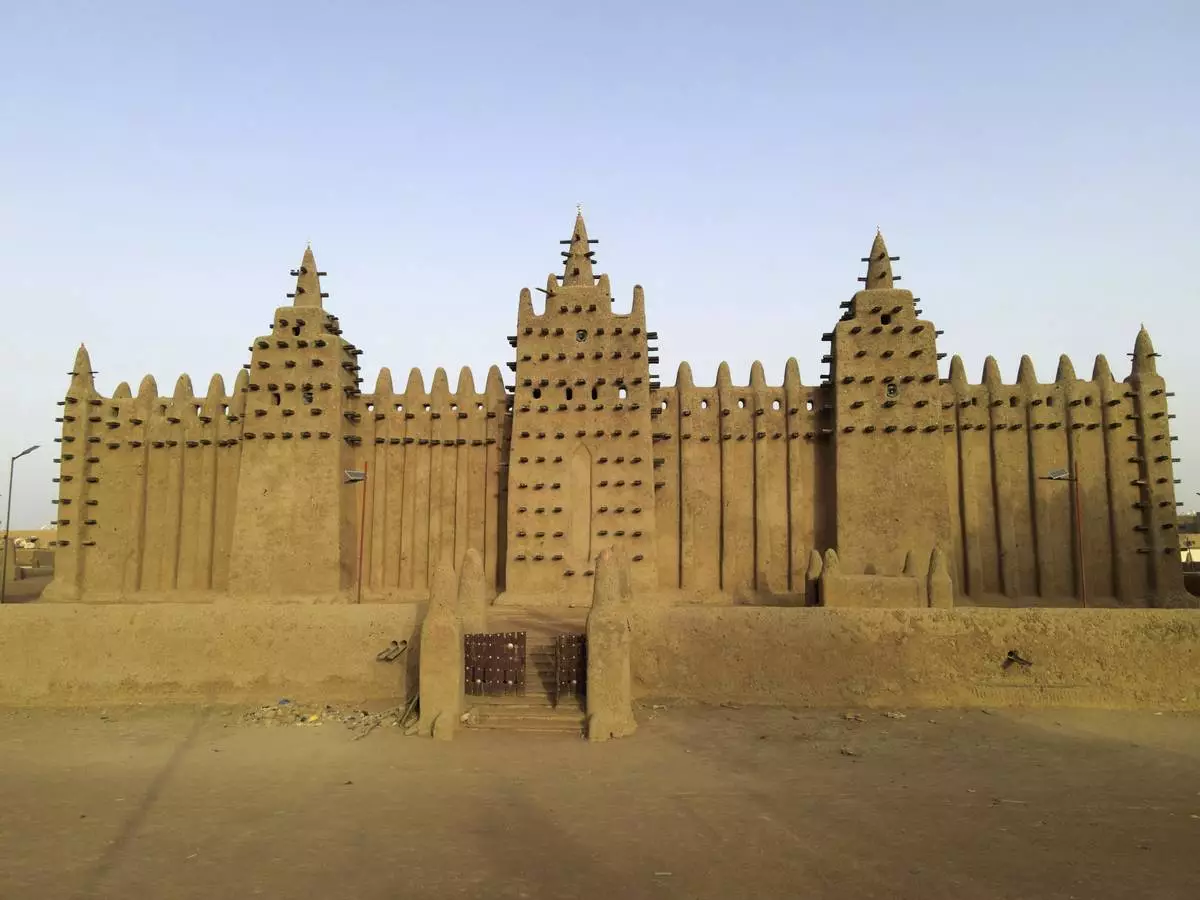GENEVA (AP) — The IOC has suspended former Olympic power broker Sheikh Ahmad of Kuwait for 15 years after his conviction for forgery was upheld on appeal this year at a Swiss criminal appeals court.
Sheikh Ahmad al-Fahad al-Sabah’s sanction for “a betrayal of his IOC Member’s oath, as well as the seriousness of the damage to the IOC’s reputation” was approved by the Olympic body’s executive board in a decision seen by The Associated Press. It was expected to be made public next week.
The 15-year suspension starts from the date of his previous ban for a separate issue of unethical conduct, in an Olympic Council of Asia election. That was a three-year sanction imposed on July 27 last year.
The sheikh, who turns 61 on the day after the Paris Games close in August, will be 74 when the latest punishment expires. Under International Olympic Committee rules his membership ends at age 80. However, the Olympic Charter allows the annual meeting of IOC members to expel a colleague for betraying their oath.
Sheikh Ahmad led the Olympic Council of Asia, that was created by his father in Kuwait, before joining the IOC in 1992. He was a longtime close ally of current IOC president Thomas Bach, whose election in 2013 he campaigned for.
The Kuwaiti royal “self-suspended” as an IOC member after being indicted in Geneva in 2018. He also stepped aside as leader of the global group of national Olympic bodies, known as ANOC.
In January, Sheikh Ahmad, his English former lawyer, a Kuwaiti aide and a lawyer based in Geneva had their convictions from September 2021 upheld on charges linked to orchestrating a sham arbitration case a decade ago.
The appeal court judges in Geneva changed the sheikh’s prison sentence to a suspended sentence of two years deferred for a probationary period of three years.
In 2013, he presented video footage to Kuwaiti authorities alleging to show a former prime minister, Sheikh Nasser al-Mohammed al-Sabah, and a former speaker in parliament, Jassim al-Kharafi, discussing a coup. They could have faced the death penalty for treason.
Lawyers for Sheikh Nasser al-Mohammed and the al-Kharafi family filed a criminal complaint in Geneva relating to the arbitration case. The arbitration which was later judged to be fake had been presented to the High Court in London as part of a process that sought to verify the videos.
Sheikh Ahmad also was a senior FIFA official from 2015-17 until withdrawing his candidacy for re-election when implicated by federal prosecutors in Brooklyn in steering bribes to soccer officials in Asia. He denied wrongdoing and was not indicted.
AP coverage of the Paris Olympics: https://apnews.com/hub/2024-paris-olympic-games

FILE - ANOC President Sheikh Ahmad al-Fahad al-Sabah of Kuwait, left, listens to IOC President Thomas Bach, right, addressing delegates during the general assembly of the Association of National Olympic Committees (ANOC) in Prague, Czech Republic, Thursday, Nov. 2, 2017. The IOC has suspended former Olympic power broker Sheikh Ahmad of Kuwait for 15 years after his conviction for forgery was upheld on appeal this year at a Swiss criminal appeals court. (AP Photo/Petr David Josek, File)

FILE - Sheikh Ahmad al-Fahad al-Sabah arrives at a Geneva's courthouse ahead of the verdict for a trial for forgery in connection with arbitration, in Geneva, Switzerland, Friday, Sept. 10, 2021. The IOC has suspended former Olympic power broker Sheikh Ahmad of Kuwait for 15 years after his conviction for forgery was upheld on appeal this year at a Swiss criminal appeals court. (Salvatore Di Nolfi/Keystone via AP, File)
DJENNE, Mali (AP) — Kola Bah used to earn a living as a tour guide in Mali's historic city of Djenné, once a center of Islamic learning known for the sprawling mud-brick mosque that has been on the UNESCO World Heritage in Danger list since 2016.
The Grand Mosque of Djenné — the world’s largest mud-brick building — used to draw tens of thousands of tourists to central Mali every year. Now it's threatened by conflict between jihadi rebels, government forces and other groups.
Bah says his income was enough to support his family, which now numbers nine children, and to pay for a small herd of cattle. But these days, few visitors come to the city, and he has been largely out of work. When he needs cash, he sells some of his cattle.
Speaking to The Associated Press outside his home in Djenné's old town, Bah said locals believed the crisis would come to an end eventually, and that business would pick up as before.
“But the more time passed, the more this dream proved illusory,” he said. “Things are really difficult now.”
Djenné is one of the oldest towns in sub-Saharan Africa and served as a market center and an important link in the trans-Saharan gold trade. Almost 2,000 of its traditional houses still survive in the old town.
The Grand Mosque, built in 1907 on the site of an older mosque dating back to the 13th century, is re-plastered every year by local residents in a ritual that brings together the entire city. The towering, earth-colored structure requires a new layer of mud before the rainy season starts, or it would fall into disrepair.
Women are responsible for carrying water from the nearby river to mix with clay and rice hulls to make the mud used to plaster the mosque. Adding the new layer of mud is a job reserved for men. The joyful ritual is a source of pride for a city that has fallen on hard times, uniting people of all ages.
Bamouyi Trao Traoré, one of Djenné’s lead masons, says they work as a team from the very start. This year's replastering took place earlier this month.
“Each one of us goes to a certain spot to supervise,” he said. “This is how we do it until the whole thing is done. We organize ourselves, we supervise the younger ones.”
Mali’s conflict erupted following a coup in 2012 that created a power vacuum, allowing jihadi groups to seize control of key northern cities. A French-led military operation pushed them out of the urban centers the following year, but the success was short-lived.
The jihadis regrouped and launched relentless attacks on the Malian military, as well as the United Nations, French and regional forces in the country. The militants proclaimed allegiance to al-Qaida and the Islamic State group.
Sidi Keita, the director of Mali’s national tourism agency in the capital of Bamako, says the drop in tourism was sharp following the violence.
“It was really a popular destination," he said, describing tens of thousands of visitors a year and adding that today, tourists are “virtually absent from Mali.”.
Despite being one of Africa’s top gold producers, Mali ranks among the least developed nations in the world, with almost half of its 22 million people living below the national poverty line. With the tourism industry all but gone, there are ever fewer means for Malians to make a living.
Anger and frustration over what many Malians call “the crisis” is rising. The country also saw two more coups since 2020, during a wave of political instability in West and Central Africa.
Col. Assimi Goita, who took charge in Mali after a second coup in 2021, expelled French forces the following year, and turned to Russia’s mercenary units for security assistance. He also ordered the U.N. to ended its 10-year peacekeeping mission in Mali the following year.
Goita has promised to beat back the armed groups, but the U.N. and other analysts say the government is rapidly losing ground to militants. With Mali's dire economic situation getting worse, Goita's ruling junta ordered all political activities to stop last month, and the following day barred the media from reporting on political activities.
Moussa Moriba Diakité, head of Djenne’s cultural mission which strives to preserve the city’s heritage, said there are other challenges beyond security — including illegal excavations and trash disposal in the city.
The mission is trying to promote the message that security isn’t as bad is it seems, he said, and also get more young people involved in the replastering ritual, to help the new generation recognize its importance.
“It's not easy to get people to understand the benefits of preserving cultural heritage right away,” he said.
The Associated Press receives financial support for global health and development coverage in Africa from the Bill & Melinda Gates Foundation Trust. The AP is solely responsible for all content. Find AP’s standards for working with philanthropies, a list of supporters and funded coverage areas at AP.org.

The streets of old town Djenne, Mali, once filled with tourists, stand empty, Thursday, May 9, 2024. The world's largest mud-brick building, the Great Mosque of Djenne used to draw tens of thousands of tourists every year to central Mali. Now it's threatened by conflict between Islamic rebels, government forces and other groups. (AP Photo/Moustapha Diallo)

The campement hotel, the only working hotel left in Djenne, Mali, sits largely empty, in disrepair without running water, Thursday, May 9, 2024. The world's largest mud-brick building, the Great Mosque of Djenne used to draw tens of thousands of tourists every year to central Mali. Now it's threatened by conflict between Islamic rebels, government forces and other groups. (AP Photo/Moustapha Diallo)

Former guide Kola Bah, who has been unemployed since Mali's conflict started and now sells from his small herd of cattle when he needs to make ends meet, poses for a photograph in Djenne, Mali, Thursday, May 9, 2024. The world's largest mud-brick building, the Great Mosque of Djenne used to draw tens of thousands of tourists every year to central Mali. Now it's threatened by conflict between Islamic rebels, government forces and other groups. (AP Photo/Moustapha Diallo)

FILE- The world's largest mud-brick building, the Great Mosque of Djenne, Mali, awaits its annual replastering, Friday, May 10, 2024. The Mosque — the world's largest mud-brick building — used to draw tens of thousands of tourists every year to central Mali. Now it's threatened by conflict between Islamic rebels, government forces and other groups. (AP Photo/Moustapha Diallo, File)















